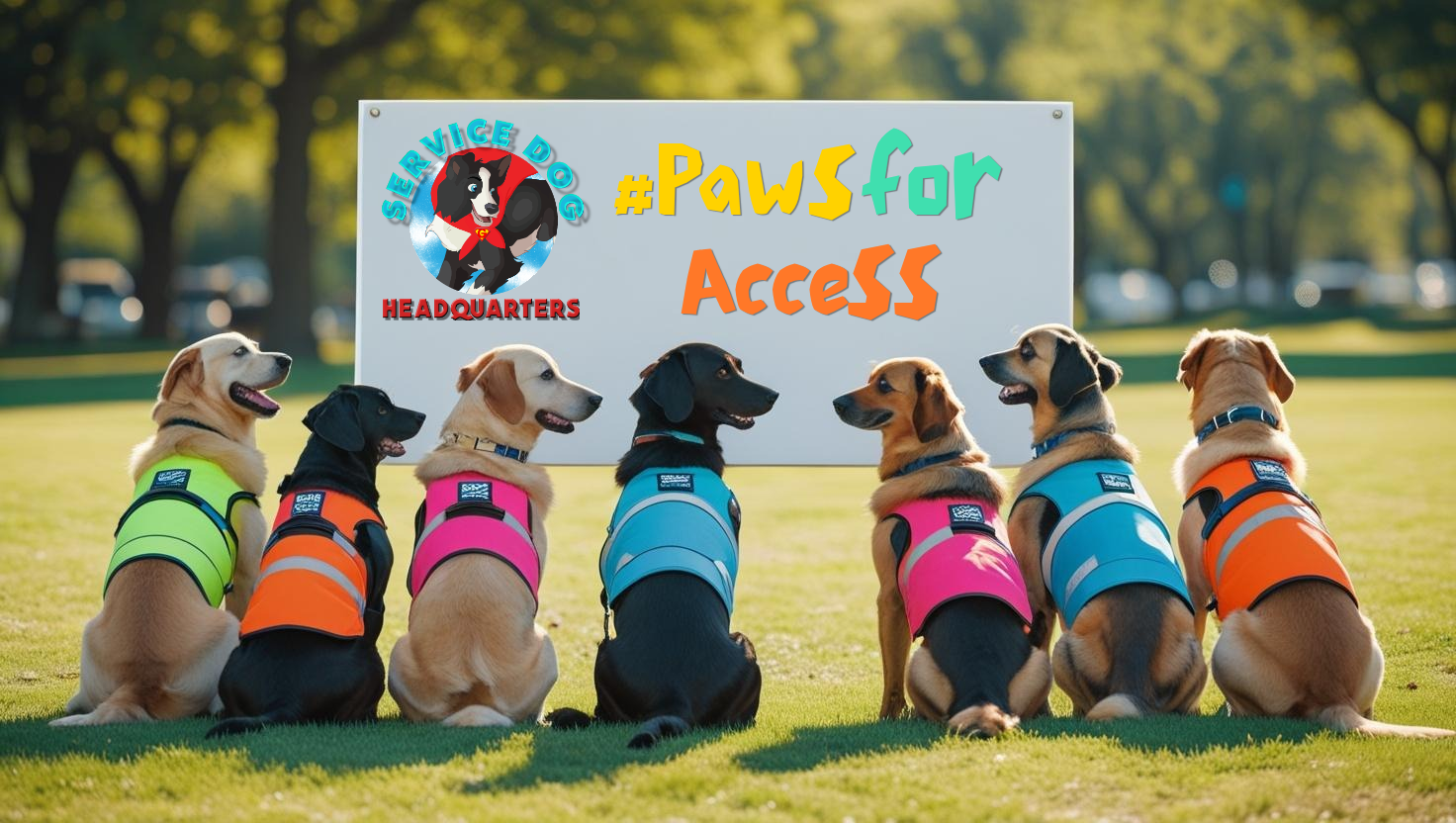Posted by Service Dog Headquarters on Aug 3rd 2025
#PawsForAccess - A Global Report on Assistance Dog Rights Rings Alarms
‘Refused, driven away from and almost run over’: assistance dog handlers share everyday experiences of
exclusion, discrimination and humiliation.
On June 2 2025 — An alarming new global survey reveals widespread challenges for handlers and their
assistance dogs accessing public spaces, despite many countries having laws to protect their rights.
Assistance dog handlers report discrimination, humiliation and exclusion from public transport, restaurants
and medical facilities.

The Paws For Access Report on Assistance Dog Rights, published jointly by Assistance Dogs International
(ADI) and the International Guide Dog Federation (IGDF), contains responses from more than 1,200
assistance dog handlers in 24 countries across the world.
Among the most concerning findings are the emotional and behavioral toll on assistance dog handlers,
particularly those living with blindness or visual impairment. Four out of every ten assistance dog handlers
— and 48% of guide dog handlers — say they sometimes stay at home or avoid public places because of the hostility they encounter when out and about.
“The repercussions of a handler being denied entry with their assistance dog extend way beyond
immediate practical inconveniences,” says ADI Executive Director Chris Diefenthaler. “The emotional and
subsequent behavioral impact of these experiences can last a long time. On top of living with a physical or
mental disability, many handlers feel burdened, frustrated and anxious.”
The report looks in detail at the main challenges experienced by assistance dog handlers including access to
public spaces and public transport; demands to verify or justify their dogs; fake assistance dogs; emotional
and behavioral impact; and infringement of human rights. The USA, UK, Canada and Australia rank among
the most unfriendly countries for handlers with assistance dogs, despite having some of the most robust
disability and discrimination laws.
“There is an urgent need for improved public education, clearer definitions of assistance dog roles, and
stronger enforcement of existing laws,” says David Maynard, Executive Director of IGDF. “This would help
mitigate the challenges faced by handlers and promote a more inclusive and accessible environment for all
assistance dog handlers. Despite legal frameworks designed to protect handlers’ rights, implementation
and enforcement is inconsistent across different regions and countries, reflecting the global disparity in the
treatment and perception of assistance dogs.

Responses suggest the worst places for access include restaurants and cafes (56%); hotels and other
accommodation (28%); medical facilities (28%); and grocery stores (19%). One respondent write “I was
refused entry to a restaurant because they said my dog would cause allergies to other customers,” whilst
another not, “‘I often feel anxious and frustrated because of the constant refusals and skepticism.”
Perhaps most worryingly — given that many assistance dog handlers are frequent users of hospitals and
clinics — 28% of respondents report discrimination while accessing medical facilities. Many note that
poorly trained, uncontrollable and disruptive ‘therapy dogs’ present in some medical facilities tend to
interfere with ADI or IGDF certified assistance dogs.
Public transport also comes in for strong criticism, with 56% of respondents globally experiencing refusals
in taxis or rideshare vehicles. Guide dog handlers report even higher refusal rates (63%).
“Uber and Lyft are the most difficult,” writes one visually impaired respondent. “I've been refused, driven away from, almost run over — you name it.”
Another notes: “Drivers suddenly accelerate when they see me waiting with my
service dog.”
The survey also reveals stark regional and national disparities. In the UK and Netherlands, 79% of handlers
report multiple access refusals within the last year, with Russia coming a close second at 71% and Ireland
(60%), Australia (58%) and the USA (35%) also scoring poorly.
Assistance dog handlers also highlight the rise in untrained, out-of-control and poorly behaved fake service
dogs, leading to skepticism or even hostility towards genuine assistance dog handlers. 50% of respondents
report demands to verify their dog as a bona fide assistance dog. One handler was turned away from a
hotel “because they didn't believe my dog was a legitimate service animal.”
Faced with these challenges, ADI and IGDF are calling for greater awareness, education and legislative
changes.
“This report is further evidence of the significant and consistent challenges faced by assistance
dog handlers daily,” said Diefenthaler. “Despite legal provisions aimed at facilitating access, many still face
undue challenges and discrimination, which not only hinders their daily activities but also impacts their
emotional wellbeing.”
The report recommends a five-point action plan to help change public attitudes and behavior based on
better education; stronger and more standardized regulations; improved identification of assistance dogs;
training for small business owners; and legal reform.
“The report makes it clear these are not isolated incidents but part of a broader systemic problem that requires a multifaceted approach,” adds Maynard. “By implementing these measures, we can create a more inclusive and understanding environment for assistance dog handlers which preserves their dignity and rights.

View the whole report and all findings here.
About Assistance Dogs International (ADI)
ADI is the world’s leading standards-setter and accreditation body for training assistance dogs. As a
worldwide coalition of nearly 200 non-profit member organizations spread across five continents. ADI is the
world’s most diverse and inclusive assistance dog certification and standard-setting body. For more
information visit https://assistancedogsinternational.org.
About the International Guide Dog Federation (IGDF)
IGDF is the charity that defines and maintains international standards for the training of guide dogs around
the world. This work ensures the quality and safety of guide dog services for people who are blind or have
low vision. As well as developing international standards, IGDF supports new guide dog organizations
around the world, helping them to grow and progress towards full accreditation against the IGDF
standards. For more information visit https://www.igdf.org.uk/
Service Dog HQ stands behind these findings and can only do so much to keep the public informed themselves alone. We ask you follow, share and Paws for Access by joining the conversation using hashtag #PawsForAccess in conversation on social media!

About the Service Dog Headquarters (SDHQ)
Service Dog HQ is a small organization helping empower those with service animals with education and important news, uplifting information, lobbying and providing partnerships throughout the industry to help you find what you need. We do a lot of lobbying and law changing behind the scenes for service dog justice. We're hoping to soon pay for a website that will ease the access to what we're up to other than facebook and instagram. You can help!
Raising our voice helps us grow, please follow us and like and share our social media links like our INSTAGRAM or FACEBOOK.
To help us continue our charity efforts and assistance, we offer great service dog gear and canine health supplies at a decent rate. All sales help us to continue our efforts. Service Dog HQ is hosted on Naturalhealthycbd.com, both are partners of The Extra Spoon, a disability advocacy company helping empower and bring unity back to your community.
This year alone, Service Dog HQ has provided assistance to multiple families, trainers, handlers, and disabled parties free of charge. Below is a list of some of what we've done this year.
- 3 missing/stolen ESAs get located.
- 9 disability sensitive homing relocations.
- 7 companies became ADA/PCI compliant.
- 6 Major leaks to protect the countries innocent, released through our team servers made nightly news.
- 8 witpro families relocated due to urgent status once funding was pulled from the program for battered women.
- 5 well placed threats to bring back transportation for senior citizens on social security (were working on it)
- 2 last minute funding lobbys to lower the impact on those entirely reliant on programs to protect them from criminals, exabusers, traffickers and violent offenders.
- 5 lawsuits won against aggressors that attacked a service animal on duty... 2 with jail time.
- 2 reunifications with emotional support animals lost during a natural disaster.
To donate to our efforts, please click below. Any and all donations are appreciated.

